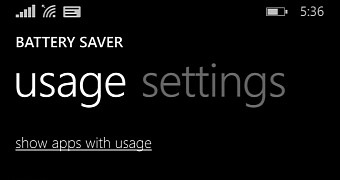WhatsApp has received quite a lot of updates on Windows Phone lately, but they still do not bring any difference for users who were experiencing extreme battery usage issues on their handsets.
And unsurprisingly, neither Microsoft nor WhatsApp is willing to comment on what exactly is happening with the app when installed on Windows Phone, so those whose devices are impacted by these battery issues have no other solution than to hope for another fix addressing the problem.
The short story so far: WhatsApp, which is currently one of the most used messaging apps no matter the platform, is also available for Windows Phone customers, but with a catch: if you use it more than ten minutes every day, it pretty much kills your battery faster than you'd expect this to happen.
This problem isn't new and was first reported by users who installed WhatsApp on their mobiles phones a long time ago, so a simple search on Google returns tens of forum discussions where affected users try to find a workaround to make their devices last more than a day when running this app.
Probably one of the biggest problems with WhatsApp on Windows Phone is not necessarily the fact that it kills the battery of the majority of devices running Microsoft's smartphone platform, but the fact that the two companies refuse to detail the problem. In other words, nobody knows for sure what's wrong with the app and if any of the two firms is actually planning to fix it at some point in the future.
“Bug fixes and improvements”
And as if this whole secrecy weren't enough, most of the updates that WhatsApp receives on Windows Phone come with vague changelogs that say almost nothing about the improvements they bring.
An update released this morning, for example, only comes with “bug fixes and improvements,” but nobody can tell for sure which are the problems that have actually been addressed in this release.
Needless to say, we're also experiencing these battery issues on our own devices, and up until now, the same behavior has been spotted on Lumia 930 and Lumia 1520. We've pushed battery optimization tweaks to extreme limits, so we disabled location services, Cortana, all background apps (with the exception of WhatsApp, of course), and all the other settings that might have an impact on battery life.
The result is easy to predict: WhatsApp continues to be the app with the biggest battery consumption on both devices, and you can see a screenshot next to the article which confirms it. The displayed battery consumption is experienced after only 20 minutes of WhatsApp usage today.
No answer, no comments, no nothing
The secrecy behind the whole saga quickly becomes frustrating for Windows Phone users, but many continue to run the app, pretty much because they have no other option. WhatsApp is so popular these days that many of our contacts use it, so without the app it's really hard to stay in touch with friends and family.
“But why so much secrecy?” you might ask. It's really difficult to find a reason that can explain this, but if you spend a few minutes thinking about it, you might come to the following two reasons:
1. WhatsApp developers don't know what's wrong with the app. This would indeed be terrible for both the company and Windows Phone users, but in case this is true, an official statement telling users that the team is actually developing a fix would really come in handy.
Obviously, that's not happening, so maybe WhatsApp is just handling the whole problem in the wrong way, but until more information is provided, it's hard to tell if this is true or not.
2. WhatsApp doesn't care about Windows Phone users. This conclusion is really harsh, but given the fact that Windows Phone is one of the platforms with the lowest market share right now, it's easy to see why the focus is currently on Android and iOS devices most of the time.
And still, this doesn't mean that WhatsApp for other devices is flawless. Nope, and if you read the article written by my colleague Filip Truta, who's actually a long-time iPhone user, it's easy to figure out that other platforms are experiencing issues as well.
In the end, it appears that Windows Phone users' only choice is to wait. And hope. WhatsApp might in the end start listening to complaints and actually fix the bugs that are really important for the majority of users. Microsoft is already doing this, but sometimes it's really hard to see it.

 14 DAY TRIAL //
14 DAY TRIAL //